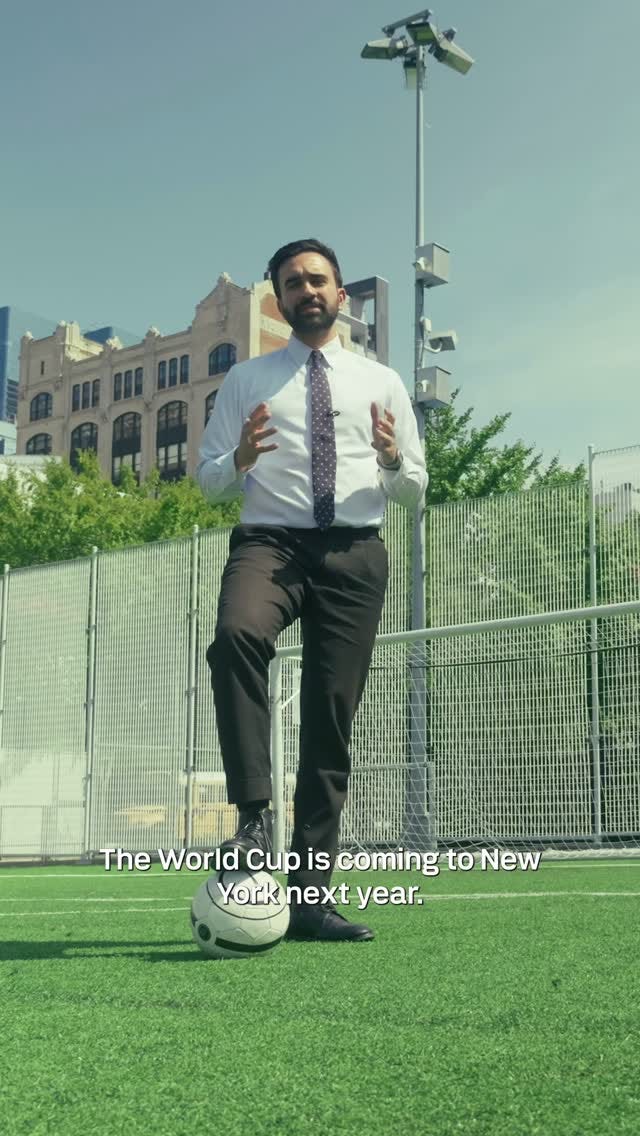World Cup 2026: Fans priced out as FIFA profits from extreme resale ticket markups
Despite promises of an accessible event, the official resale market lacks apparent price controls, allowing tickets in all categories to sell for multiples of their original cost
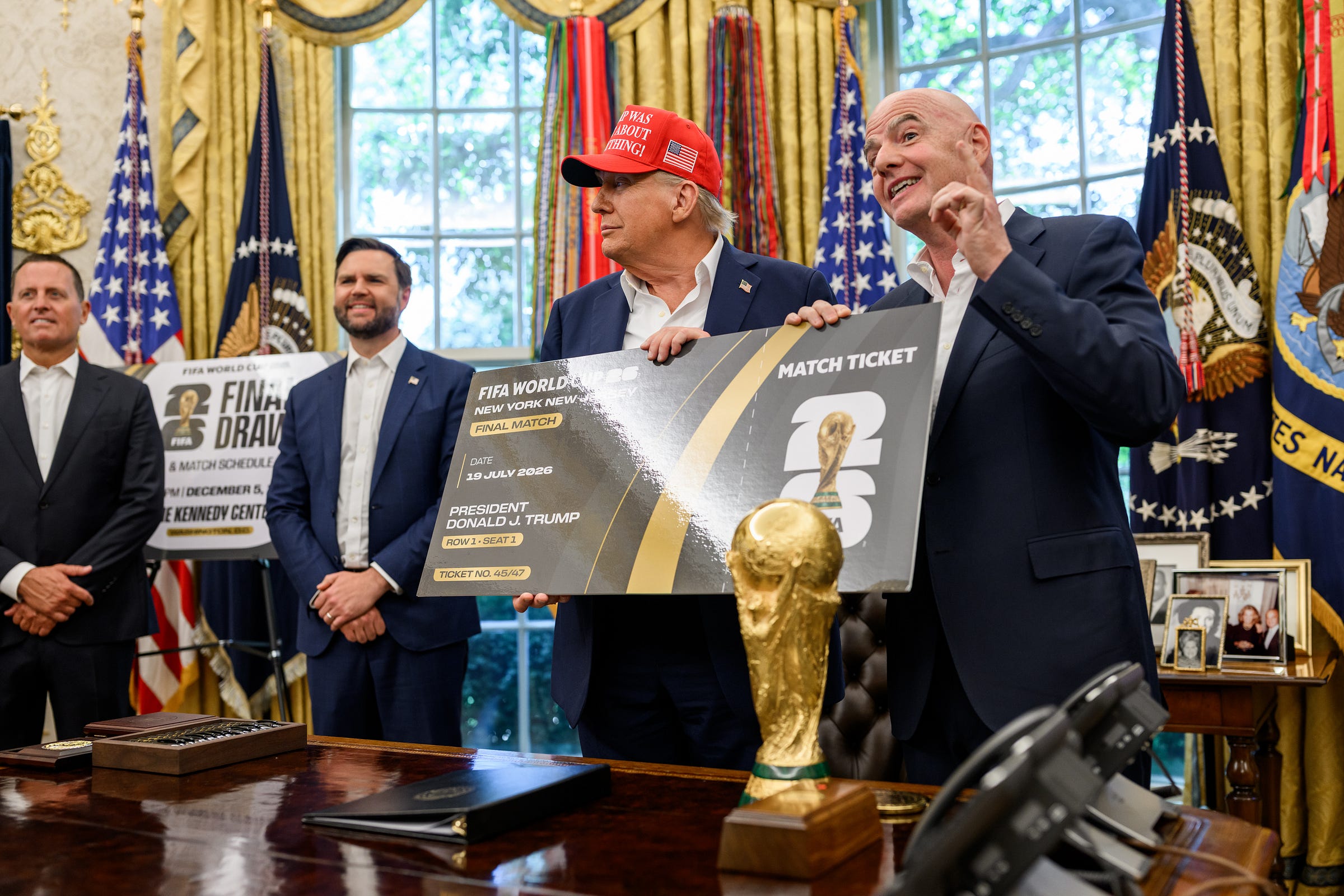
Tickets for the 2026 World Cup are being listed for resale on FIFA’s own platform for tens of thousands of dollars — with some standard stadium seats commanding prices into the hundreds of thousands.
An analysis by Eurovision News Spotlight of the FIFA-facilitated resale prices for all 104 World Cup fixtures showed a ticket for a semi-final in Dallas listed for sale at close to a million dollars — $959,394.57.
Few price controls were in apparent effect, despite the fact that there are differing rules across the U.S., Canada and Mexico, where the games will take place. The most aggressive markups were systematically pricing out budget-conscious fans, with the cheapest seats being resold in some cases for over 10 times their original cost.
FIFA’s own ticketing platform is handling resales for the tournament and, by keeping it all in-house, is able to charge both buyers and sellers a 15% facilitation fee on each second-hand ticket. With some tickets being listed in the hundreds of thousands of dollars, FIFA stands to make back a significant amount on resales, as well as the cost of the initial ticket bought at face value.
The extreme markups are concentrated in specific geographic hotspots and across even the most affordable ticket categories, transforming what was promised to be a globally accessible tournament into a luxury event. More than 1 million tickets have already been sold in the initial phase to people from 212 different countries and territories, demonstrating massive global demand despite the eye-watering prices.
While several countries in Europe and around the world have put in place regulations to stem ticket ‘scalping’ or ‘touting’ — the practice of buying up tickets for concerts or matches at face value and reselling them at huge profits — there are few federal controls in the United States, despite scrutiny on platforms like Ticketmaster in recent years as concert prices spiralled out of control.
In Mexico, there are consumer protection laws against resales or ticket transfers above face value, but these did not appear to be being enforced for the World Cup. Tickets will also appear on third-party resale sites, but this analysis focuses only on FIFA’s internal resale platform.
Huge markups across all ticket categories
The tickets are divided into categories designed to offer different price tiers to fans hoping to attend the tournament. Category 1 features the highest-priced seats located mainly in the lower tier nearer to the pitch. Category 2 is further back, with some seats available in both the lower and upper tiers of the stadium.
Category 3 tickets are mainly in the upper tier of the stadium. Meanwhile, Category 4 consists of small sections at the far reaches of the stadiums, and were billed as being the most affordable category with tickets originally costing as low as US$60. On FIFA’s own website, the governing body said: “These categories aim to offer a variety of options for different needs to ensure that all fans can enjoy the tournament.”
Despite this, every category sold out in an initial round of releases, and many tickets reappeared on FIFA’s own internal resale platform for many multiples of the face value with no apparent upper limit or controls.
An archived version of an analytics website that tracks FIFA ticket prices showed the prices of the seats on their first sale. Unlike at previous World Cups, FIFA rolled out a dynamic pricing model for the 2026 tournament, meaning there is technically no standardized ‘face value’ for tickets of the same category for the same match. For the purposes of this analysis, we counted the first available figures as ‘face value’.
It had been anticipated that the dynamic pricing would lead to hikes after the World Cup draw on December 5. However, the price jump kicked in earlier, with a report by The Athletic saying that FIFA raised the ticket prices for nine of the matches after just one full day of sales in response to demand.
Category 1: High premium for tickets closest to pitch
The lowest price we found for a Category 1 seat was $552 in Kansas City for a Group F match, a relatively small markup from the $410 these tickets originally sold for. However, it was a different story at the highest point of the scale for each match, where people were listing tickets for tens and in some cases, hundreds of thousands of dollars.
Match 103, the ‘bronze final’ between the losers of both semi-finals, which is scheduled to take place on July 18 in Miami, featured a Category 1 ticket that was even more expensive than the maximum price for the actual final. While tickets in this section went on sale for $1,000, a resale ticket was available for $203,550.
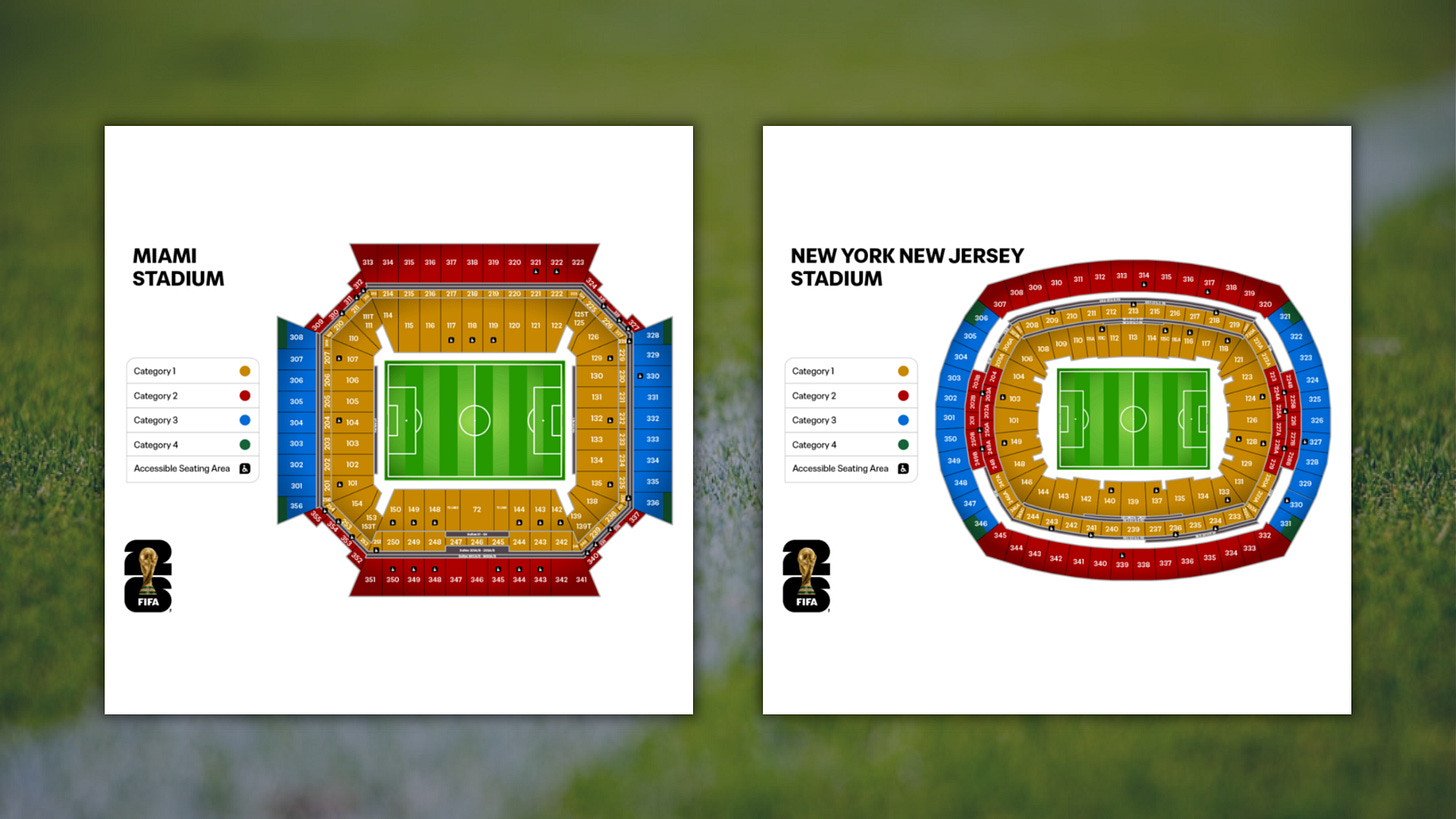
For the World Cup final, a ticket was found with a listing price of $57,500. But the high upper limit prices can be seen across the tournament, with a $98,982.36 ticket seen for the United States’ opening game in Los Angeles on June 12.
More expensive tickets could yet appear for these later matches, given that fans will not know if their team will reach the late stages until the tournament is well underway. Even the earlier group stage matches will be subject to much reselling and transferring of tickets in the coming weeks, due to the fact that the group draw which will determine the runners and riders in each group is not taking place until December 5.
Category 2: Tickets costing hundreds of thousands being assigned to buyers
Category 2 tickets are the ‘medium’ option, with tickets stretching back to the edge of the stadium for some matches. Despite this, the highest resale prices we saw were from this category, with several tickets listed in the hundreds of thousands and two close to a million dollars.
The most expensive ticket price in this analysis was $959,394.57, a Category 2 ticket for a semi-final in Dallas on July 14. A Category 2 ticket was also listed for the other semi-final in Atlanta the next day for $893,550.
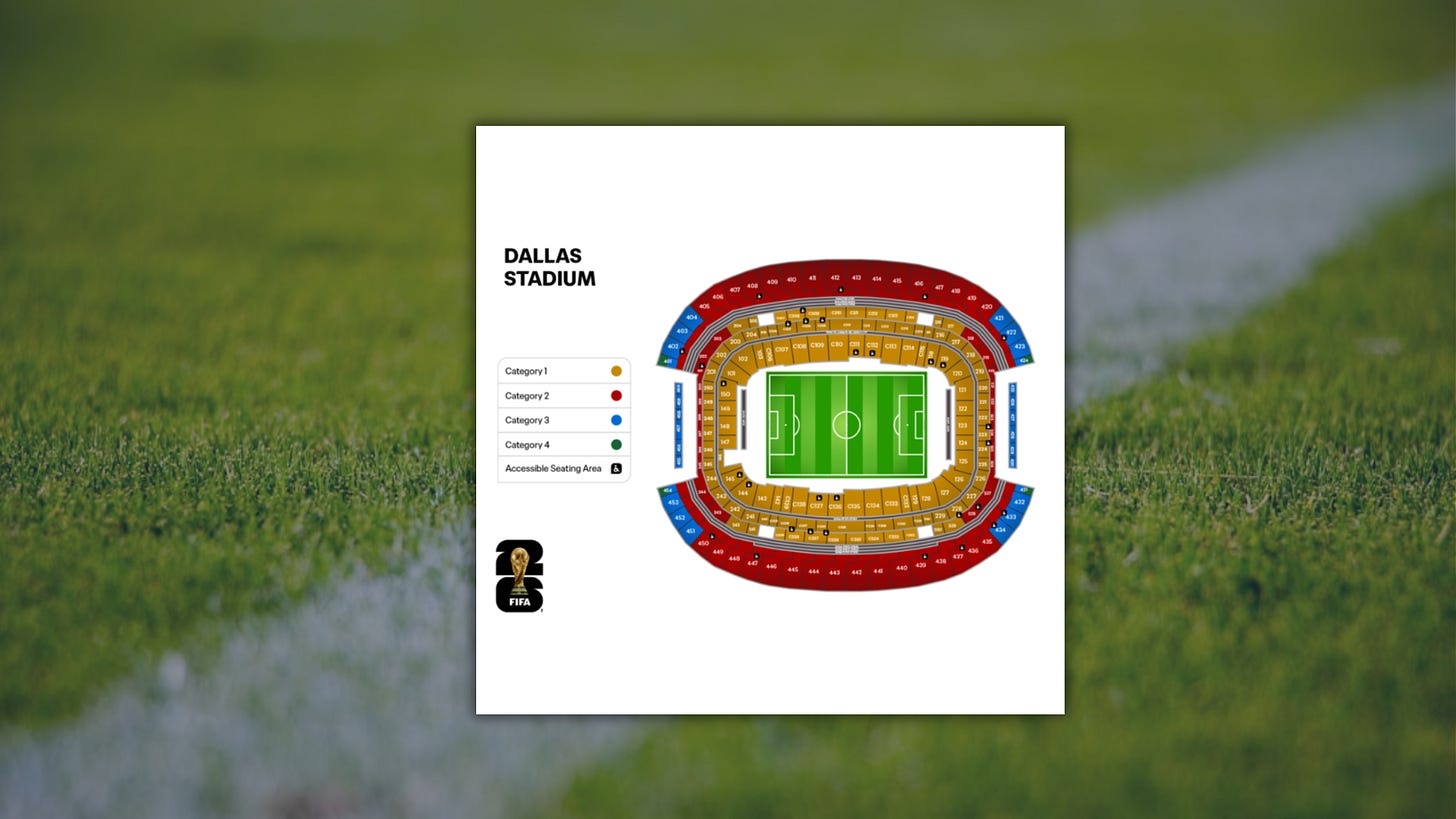
On the other end of the scale, there were Category 2 tickets for matches across the tournament available for between $400 and $500. The situation exposes the huge gulf in ticket valuation, where punters or even professional ticket scalpers are allowed to publish listings with virtually any asking price.
When a buyer selects a ticket they wish to buy, the FIFA Resale Marketplace automatically assigns the lowest-priced ticket available for purchase, but it was unclear whether FIFA planned to do anything about the extremely expensive listings that would come into effect after the cheaper options were sold out.
We went through the process of buying four Category 2 tickets for the semi-final in Atlanta. Three tickets costing just under $4,000 each were assigned, while the fourth appeared with a price tag of $213,870 (before the FIFA resale fee of $33,872 was added to the entire basket). It was not clear where in the stadium the seats were or whether they were together; in the basket, a notice read: “Seat will be assigned later.”
Category 3: From $300 to $100,000 to sit in upper tiers
Category 3 should have among the cheapest tickets for the World Cup matches, as for the most part, these seats will be in the upper tiers of each stadium.
Nonetheless, there is still a huge variety of prices in this category. Once again, the semi-final in Atlanta is home to a Category 3 ticket listed for over $100,000. The World Cup final in New York/New Jersey has an upper level ticket in this category priced at $32,085.
The opening match for the U.S. in Los Angeles similarly has a ticket costing over $30,000. A ticket was seen for $28,750 for the first match in San Francisco and $18,400 tickets were found for round of 32 matches in Boston and Seattle.
But once again, the situation was varied. Category 3 tickets for various matches in Atlanta and Kansas City were found in the $300 range — still over double the face value but much more affordable than the maximum resale values.
Category 4: ‘The world will be welcome’ despite record costs
Gianni Infantino promised “the world will be welcome” at the World Cup, and in that spirit, tiny sections at the outer edges of each stadium were set aside for Category 4 tickets, which were supposed to cost as little as $60 for some matches throughout the tournament.
The dynamic pricing was clearly in effect, because even at face value, the prices varied across matches with higher demand, such as games where the home teams were confirmed to be playing and the late stage matches. For the final, these so-called inclusively-priced tickets were listed at face value for over $2,000. For context, the lowest-priced tickets for the finals at Qatar 2022 and Russia 2018 cost less than $600 and $500 respectively.
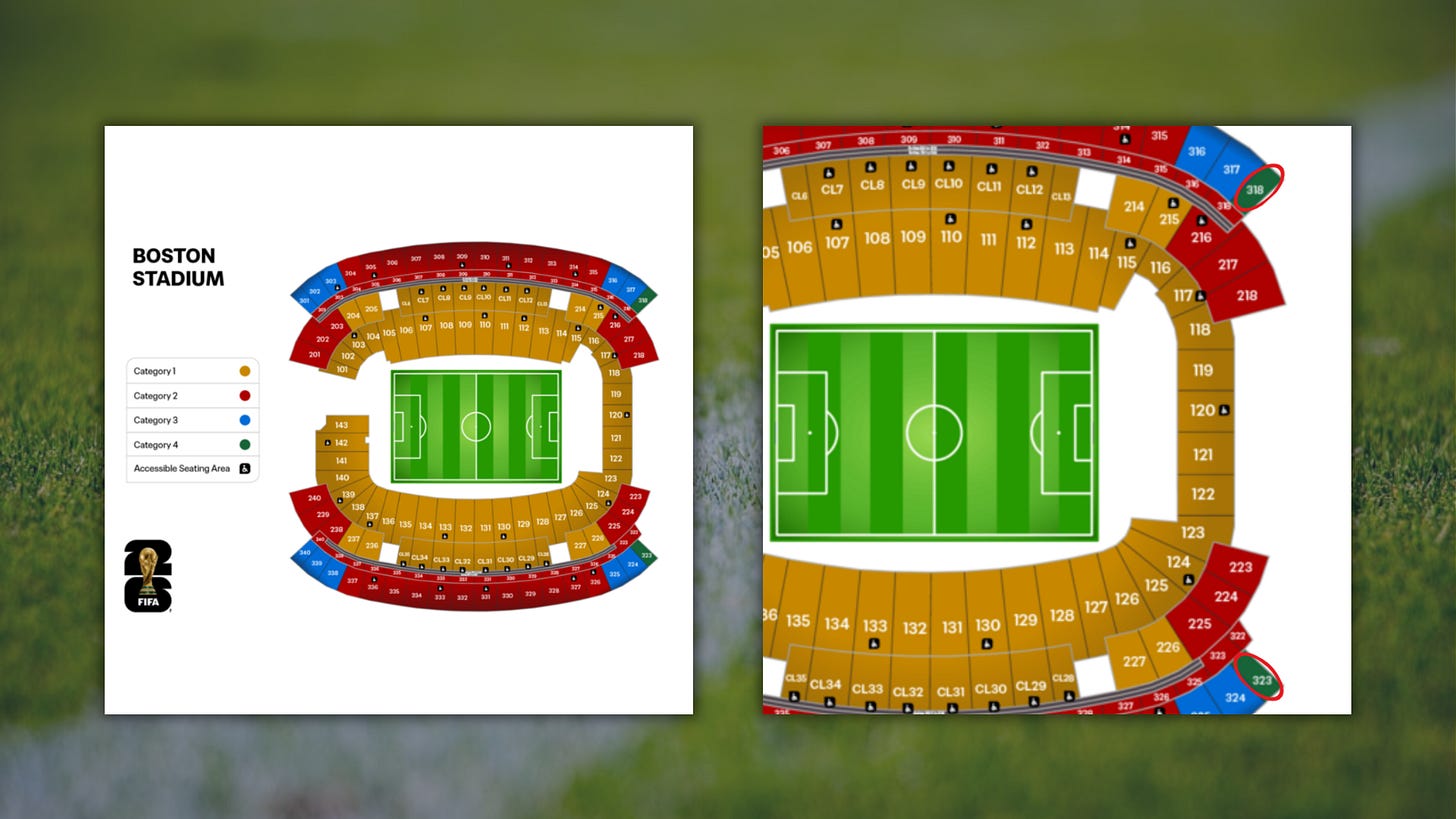
However, analysis showed that even the cheapest of these low-cost tickets were quickly sold out and are being resold at several times their original value.
Category 4 resale prices were reaching over $40,000 for the World Cup final at New York/New Jersey Stadium, with the cheapest available option being $342.70 for a group stage match at Kansas City Stadium — a ticket that originally cost $70.
Car parking to cost more than some match tickets at previous World Cups
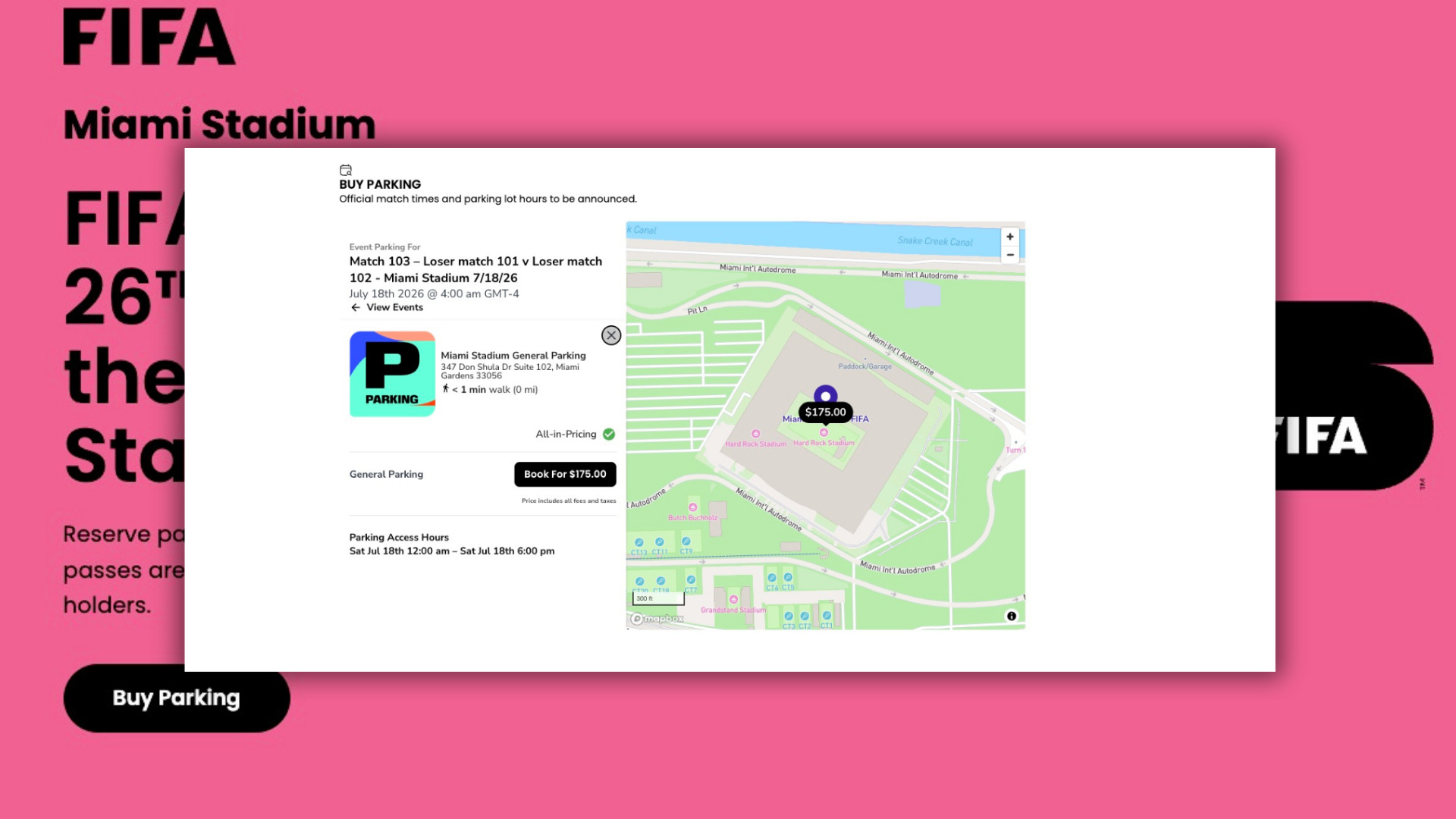
While the headline figures for attendance at the World Cup centre around the ticket prices, early indications show the cost of parking near the events in the U.S. will also be steep.
Not all of the host cities have yet revealed the parking costs for the fixtures, but of those that are available, a dynamic price structure appears to also be in place, with parking costing more as the tournament goes on and the matches become more consequential.
In Miami, parking for the group stage matches starts at $75, climbing to $175 for the bronze final. In Kansas City, it will cost $75 to park a car for the group stage and round of 32, rising to $126 to park outside the quarter-final. Parking a car at the 2026 tournament will be more expensive than some of the match tickets themselves at previous World Cups.
FIFA has typically worked with local authorities to run additional buses and other modes of transport for fans to and from stadiums at major tournaments. No concrete details have yet been announced for any similar plans for the 2026 World Cup, but some World Cup executives have suggested there will be public transport options given the number of fans travelling from abroad.
‘Record business’
When Gianni Infantino presented U.S. President Donald Trump with the first World Cup final ticket at a meeting in the Oval Office in August of this year, the president quipped: “You’re going to do record business here, I think.”
That much is undeniable. But there has been pushback to FIFA’s profit-driven model. During his successful election campaign to become mayor of New York City, Zohran Mamdani released footage calling on FIFA to abandon its dynamic pricing model and “put game over greed” for the upcoming tournament, saying: “The biggest sporting event in the world is happening in our backyard. But most New Yorkers will be priced out of watching it live.”
FIFA has defended its variable pricing structure, telling news outlets in a statement that it is based on the existing ticketing model in the host nations. “The pricing model adopted generally reflects the existing and developing market practice in our co-hosts for major entertainment and sporting events, soccer included. We are focused on ensuring fair access to our game for existing but also prospective fans, and are offering group stage tickets starting at 60 U.S. dollars, a very competitive price point for a major global sporting event in the U.S.”
As for its resale platform strategy, FIFA said it “will provide fans looking to sell or purchase tickets on the secondary market with a safe and secure method to do so, as permitted by U.S. legislation”. With its resale fees, FIFA is undoubtedly looking to profit directly from secondary sales, instead of leaving the market open to third-party ticket resellers like Viagogo and StubHub. It says this will ensure “as much value as possible is retained for redistribution into the game globally”.
What remains to be seen is the impact this has for the future of the world’s most popular sport, which has erstwhile been praised for its power to unite the world, from its richest to its poorest corners.
SOURCES
Fifa.com. (2025). Available at: TICKET PRODUCTS AND CATEGORIES [Accessed 12 Nov. 2025].
Fifacollectanalytics.com. (2025). [online] Available at: Ticket Prices (archived here.) [Accessed 13 Nov. 2025].
Bushnell, H. (2025). FIFA to use dynamic pricing for World Cup 2026 tickets; prices range from $60 to more than $6,000. [online] The Athletic. [Accessed 12 Nov. 2025].
Reuters (2025). More than one million World Cup tickets sold through Visa pre-sales. [online] Reuters. [Accessed 12 Nov. 2025].
Fifa.com. (2025). Available at: View the FIFA World Cup 26™ match schedule [Accessed 13 Nov. 2025].
Fifa.com. (2025). Inside FIFA. [online] Available at: Adaptable, efficient transport solutions [Accessed 13 Nov. 2025].
X (formerly Twitter). (2025). Available at: The biggest sporting event in the world is happening in our backyard. But most New Yorkers will be priced out of watching it live. [Accessed 13 Nov. 2025].
Ziegler, M. (2025). World Cup final: cheapest available ticket priced at £1,500. [online] Thetimes.com. [Accessed 13 Nov. 2025].
PA (2025). FIFA defends 2026 World Cup prices after fan group criticism - ESPN. [online] ESPN.com. [Accessed 13 Nov. 2025].




